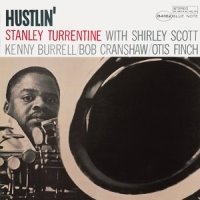Stanley Turrentine - Hustlin' (1964)
 After the Adderley Brothers, Stanley Turrentine and Shirley Scott represent the most prominent and prolific example of family teamwork in 1960s jazz. The saxophonist and organist were married during those years, and built upon the reputations each had established independently as recording artists prior to their union. During a stretch of slightly more than seven years between 1961 and 1968, Turrentine and Scott documented their partnership frequently on Scott albums for Prestige, Impulse and Atlantic, and on several of Turrentine's on Blue Note sessions as well as his one Impulse release. The beginning of their shared discography in June 1961 saw attempts to get around perspective contractual conflicts, with a Stan Turner taking sax credits on Scott's Prestige album Hip Soul while Turrentine's Dearly Beloved on Blue Note featured organist Little Miss Cott. No one was fooled in either instance, and the half-hearted subterfuge was abandoned on subsequent albums.
After the Adderley Brothers, Stanley Turrentine and Shirley Scott represent the most prominent and prolific example of family teamwork in 1960s jazz. The saxophonist and organist were married during those years, and built upon the reputations each had established independently as recording artists prior to their union. During a stretch of slightly more than seven years between 1961 and 1968, Turrentine and Scott documented their partnership frequently on Scott albums for Prestige, Impulse and Atlantic, and on several of Turrentine's on Blue Note sessions as well as his one Impulse release. The beginning of their shared discography in June 1961 saw attempts to get around perspective contractual conflicts, with a Stan Turner taking sax credits on Scott's Prestige album Hip Soul while Turrentine's Dearly Beloved on Blue Note featured organist Little Miss Cott. No one was fooled in either instance, and the half-hearted subterfuge was abandoned on subsequent albums.While they toured as a unit throughout the decade, both Turrentine and Scott liked variety in the recording projects. For his part, Turrentine only designed five of his Blue Note sessions around Scott, which is not even a third of his output of the label. Three of the five were produced in the year that seperates the February 1963 Never Let Me Go (Scott's first Blue Note credit under her own name) and the present session. Each Turrentine date with Scott has its own distinct feeling thanks to adjustments in instrumentation, though it is worth emphasizing that most of their recorded encounters include a bassist. We tend to think of the "classic" organ/tenor configuration as a quartet completed by a guitar and drums, like the Jimmy Smith recording units on Midnight Special and Back at the Chicken Shack that marked Turrentine's debut on Blue Note. Of course, one thing that made Smith incredible is that he never used a bassist and always supplied his own bass lines (He never carried a horn in his working band of the time, either). Scott generally worked with a bass and without a guitar when recording under her own name, on the Eddie Davis Prestige sessions that initially established her reputation, and in her partnership with Turrentine. She contributes intriguing bass lines on Dearly Beloved, a rare tenor/organ/drums date in Scott's discography; but the pianistic clarity she achieved through her personalized settings of the organ stops is heard to better advantage when an acoustic bass is holding down the bottom, as Bob Cranshaw does here.
Where Ray Barretto's conga drums were employed on Never Let Me Go, and Blue Mitchell's trumpet graced Turrentine's next album with Scott, A Chip Off the Old Block from October 1963, the added starter here is Kenny Burrell. The saxophonist and guitarist had first demonstrated compatibility on the aforementioned Jimmy Smith albums, and on such other memorable occasions as Burrell's Midnight Blue, and the guitarist is once again an ideal collaborator here. He is both modern enough to flow through the chords of the pop songs and soulful enough to sustain the mood of the blues titles; his supple guitar is a fine complement to Scott's organ sound; and he accompanies with shifting figures that add a quiet charge to the background. In this last regard, note "Trouble (No.2)" where Burrell's supporting work stays out of a fixed pocket and leads Scott into some surprising responses.,
Few players in the modern mainstream had Turrentine's gift for assembling programs including both arcane tune choices and the down-to-earth lines that the last Turrentine/Scott sessions for Blue Note (from August 1968) referred to as his Common Touch. This second "Trouble" has different, hard-shuffling feeling than the version contained on "Never Let Me Go", where Barretto played tambourine. It is from the book of popular vocalist Lloyd Price, whose band's up-tempo instrumental version of "Misty" was the basis for another successful jazz cover by organist Richard Holmes. It provides a touch of gospel that effectively contrast the no-nonsense minor blues "The Hustler" and the airier blues waltz "Ladyfingers". The traditional African-American melody "Goin' Home", which Dvorak had adapted for his famous symphonic work after a visit to the United States, adds another distinct blues flavor that the band addresses with dignity rather than false fervor.
There is also great dignity in the two remaining selections, especially when Turrentine plays the melody choruses. Stating a theme without undue distortion and still getting your own personality across is a mark of distinction for any jazz soloist of any era. The way Turrentine plays "Love Letters" and "Something Happens To Me" let us know, even without hearing the lyrics, exactly what these songs mean, and also announces that we are in the presence of a true master.
No comments:
Post a Comment